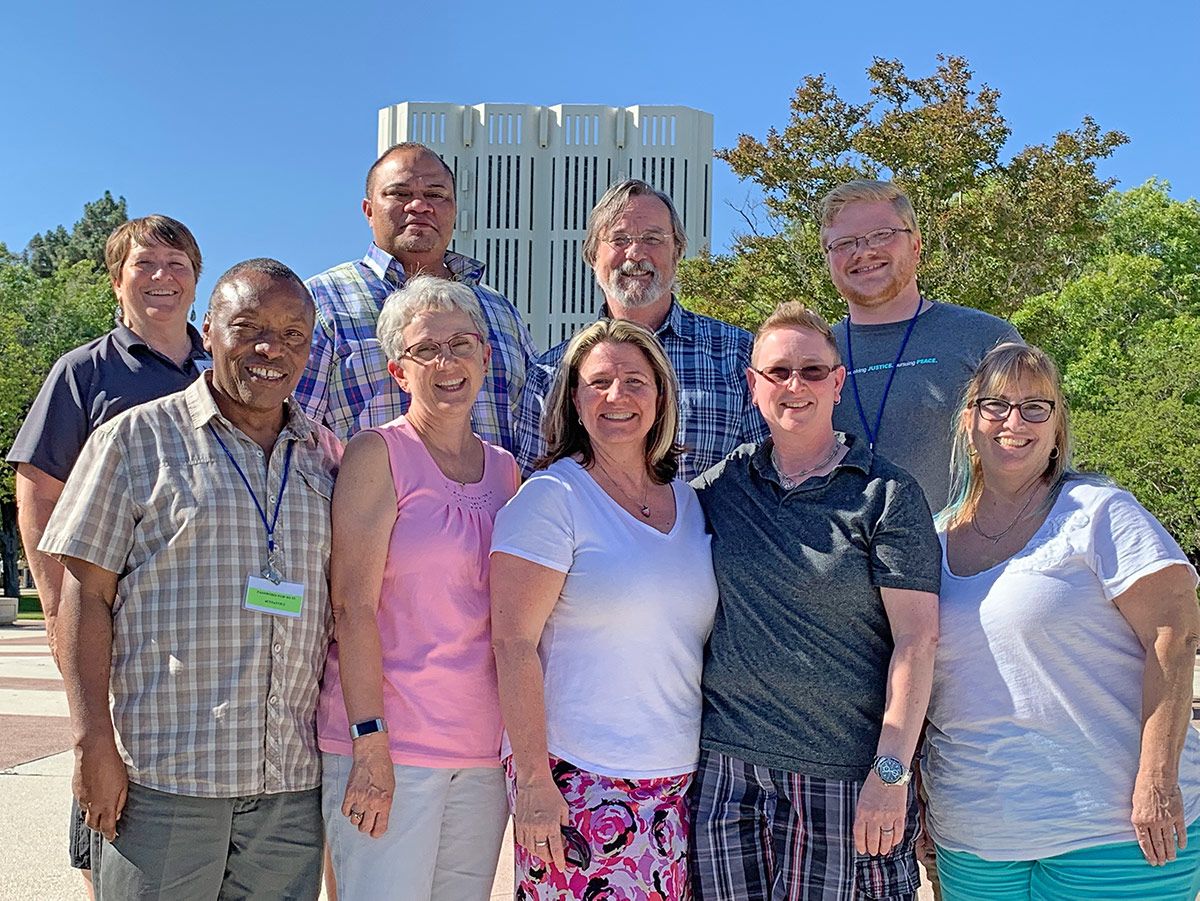Author: Greater NW Communications
Random acts? No. Lifestyle change? Yes.
When Up is Down, and Down is Up
Graduating From Rules to Spacious Freedom
CrossOver reflection for Week 31 • Beginning July 7, 2019
We Make the Road by Walking, Chapter 44
Rev. Jenny Smith
You’ve likely heard of the playground experiment. A team put a fence up around a playground. Children ran all over the playground and felt free to explore. When the fence was removed, researchers noticed children gathered around their teacher and were reluctant to explore.
Rules (and fences) can be helpful. They make us feel safe. They give us boundaries. Someone determined the rule was helpful and needed. This works. Until it doesn’t. We grow, change, ask new questions and the rules that previously gave us freedom now keep us trapped.
We’re ready for wisdom.
My dad recently retired as a United Methodist pastor and I appreciated his comment that at
Eugene Petersen puts it like this in 2 Corinthians 6:11-13 in The Message: “I can’t tell you how much I long for you to enter this wide-open, spacious life…The smallness you feel comes from within you. Your lives aren’t small, but you’re living in a small way…Live openly and expansively!”
It’s worth asking in stuck, tight, anxious, scarcity moments: What rules am I living by that are slowly taking my life? Am I open to some new wisdom? To receive it, I have to first believe I don’t actually know everything. And isn’t it surprising how often we find ourselves thinking we do?
McLaren puts it this way: “When we’re ready, the Spirit leads us to graduate from rule-oriented primary school to secondary school with its new emphasis: wisdom.” Wisdom is more than rule-following. It’s Spirit-leading.
To graduate from rules to wisdom, we’re invited to not simply follow a different plan. We’re invited to move in an entirely different way. We need this as individuals. We need it especially as faith communities.
A spacious community living from wisdom instead of rules asks different questions. They address their fear and dig underneath it. They resist scarcity. They practice trusting abundance.
Are there rules your community follows that don’t feel life-giving anymore? It’s helpful to name them aloud in safe group conversation spaces. You can help your faith community dig into good conversations and do courageous work to discern and name where God may be inviting you next.
Spacious communities trust God’s wisdom is gloriously sufficient to hold us as old rules fall away. Spacious communities know grace and love will birth new ways of being beloved community together. Spacious communities do the work to grieve what is shifting. It is a kind of death. And they prepare for the resurrection!
I offer this reflection as a prayer for your local church family:
A Spacious Community
There’s room to breathe
In a spacious community
There’s space to bring
Who you are
There’s margin to explore
A new perspective
That could change everything
A spacious
Exclusive
Restrictive
Confining or
Suffocating
A spacious community
Breathes freedom into the
Tight
Anxious
Confusing
Painful
Knots of our souls
In spacious community
There
Movement
Gift
Joy
Sorrow
Doubt
Peace
Love
Is fully alive
Showing up with courage
Paying attention to pain
Cooperating with Love
Releasing the assumed outcome
So that Love gets a wide-open playground
To skip, climb, slide and giggle
Its way through us all
Amen!
Rev. Jenny Smith serves as pastor to Marysville United Methodist Church in the Pacific Northwest Conference. You can find more of her writing on her blog.
WJ Course of Study and Licensing School programs include 10 students from Greater Northwest
Let’s be in joyful prayer for the ten United Methodists from across the Greater Northwest Area who are at Claremont School of Theology this summer receiving theological training and leadership skills through the Western Jurisdiction’s Course of Study (COS) or Licensing School programs. Licensing School completes on July 4th, and the second session of Course of Study concludes on July 6th.
You can learn more about these programs at localpastor.org
Thanks to Christy Dirren who sent us this photo!
Students as pictured about, left to right, starting with the back row:
- Karen Fisher – Lake Chelan UMC, Lake Chelan, WA – Licensing School
- Pastor Selusi Tuilemotu – 1st Samoan UMC, Anchorage, AK – COS 5th year and graduating
- Pastor Steven Berry – Upper Rogue Valley UMC and Gold Hill UMC,
OR – COS 2nd year - Pastor Ryan Scott – Grants Pass UMC, Grants Pass, OR – COS 3rd year
- Cyrus Githinji – Valley and Mountain Fellowship – Seattle, WA – Licensing School
- Pastor Alice Warness – Royal City UMC, Royal City, WA – COS 5th year and graduating
- Pastor Christy
Dirren – West Portland UMC, Portland, OR – COS 5th year and graduating - Tammy Jane – Edmonds UMC, Edmonds, WA – Licensing School
- Leslie McGowan – Simpson UMC, Pullman, WA – COS 1st year
Not pictured:
- Pastor Cody Stauffer – Clarkston UMC, Clarkston, WA – COS 5th Year and graduating
Being God’s Favorite
A Sunday of Solidarity for Suffering Children
Children separated from families, held at overcrowded detention centers without food, soap or medical care…
Parents and children fleeing danger, denied safe entry, dying as they cross the border…
Who can read the stories and see the images from the US border with Mexico this week and not be moved to compassion and action?
Courageous journalists and advocates tell the stories of inhumanity and tragedy. If you haven’t read them, I encourage you to do so, with the compassionate heart of Jesus. Here are a few examples:
- Migrant children describe neglect at Texas border facility
- Border Patrol finds three children, one woman dead at South Texas border
- Shocking image illustrates crisis at the US-Mexico border
People fleeing violence in their homelands, meet violence at the border of the United States: rejection, separation, incarceration, neglect and death. It’s easy to feel the revulsion when it’s innocent children. Our faith reminds us that every migrant arriving at the southern border is a beloved child in God’s eyes, equally worthy of the care, dignity, and respect that we would afford to our children or grandchildren.
I am asking each local church and faith community in the Greater Northwest Area to prayerfully join me and the United Methodist Committee on Relief (UMCOR) in observing a ‘Sunday of Solidarity for Suffering Children’ on Sunday, June 30.
Below you’ll find UMCOR’s encouragement toward prayer, action, and generosity on behalf of all of God’s Children. Let’s take action to respond with open hearts and minds this week to embody God’s love and make a difference.
Love God with all your heart, soul, strength and mind. And your neighbor as yourself. Do this and you will live.

Elaine JW Stanovsky
Resident Bishop
UMCOR: A Sunday of Solidarity for Suffering Children | Sunday, June 30
In light of the recent news about children in U.S. government holding facilities along the U.S.-Mexico border, the United Methodist Committee on Relief has received numerous requests to respond. We have heard the plea for action from the church. Unfortunately, the facilities in question are managed in such a way that precludes even UMCOR’s assistance. Access to these government facilities is extremely limited.
As the arm of The United Methodist Church mandated to cultivate and promote mission, the General Board of Global Ministries seeks to equip your church with tools to use as you confront the frustration and helplessness that this situation evokes. While this particular case is in the U.S., we recognize that migration is a global issue and the breadth and depth of our Global Migration programming at UMCOR and Global Ministries reflects that fact.
As a church that is united on the need to care for children, we can be in mission together.
This Sunday, June 30, Global Ministries encourages you to take part in A Sunday of Solidarity for Suffering Children in three ways:
PRAY – We encourage you to pray for children. Below, you will find a prayer to use this Sunday. You might choose to dedicate a service to suffering children everywhere or conduct a prayer vigil in your community for the children suffering along the border.
ACT – We encourage you to act on behalf of children. While we cannot take UMCOR hygiene kits to the U.S. government holding centers, we are distributing UMCOR hygiene kits at transitional shelters all along the US-Mexico border. In the last three months, UMCOR delivered 46,128 hygiene kits to six church-run transitional shelters. Instructions on how to make and send these kits are available here.
You can also act by calling your U.S. elected officials. This link to the General Board of Church and Society, our sister United Methodist agency responsible for advocacy, will give you some suggestions on issues to raise with these officials.
GIVE – Finally, we encourage you to give on behalf of children. Through the Global Migration Advance, UMCOR provides grants to organizations along the U.S. border and elsewhere around the world that are working to fill gaps in the needs and rights of migrants.
Jesus implored his disciples to welcome the children. This is our mission: to make sure the children are welcomed. Thank you for your prayers, your actions and your gifts.
For media information, contact Marcy Heinz.
For program information, contact Mia Nieves.
A Prayer for Suffering Children
God of All Children Everywhere,
Our hearts are bruised when we see children suffering alone
Our hearts are torn when we are unable to help.
Our hearts are broken when we have some complicity in the matter.
For all the times we were too busy and shooed a curious child away,
forgive us, oh God.
For all the times we failed to get down on their level and look eye to eye with a child, forgive us, oh God.
For all the times we did not share when we saw a hungry child somewhere in the world, forgive us, oh God.
For all the times we thought about calling elected officials to demand change, but did not, forgive us, oh God.
For all the times we thought that caring for the children of this world was someone else’s responsibility, forgive us, oh God.
With Your grace, heal our hearts.
With Your grace, unite us in action.
With Your grace, repair our government.
With Your grace, help us to find a way to welcome all children everywhere,
That they may know that Jesus loves them,
Not just because “the Bible tells them so,”
But because they have known Your love in real and tangible ways,
And they know that nothing, absolutely nothing, can separate them from Your love.
Amen.
Don’t wait! It’s your turn…
CrossOver reflection for Week 29 • Beginning June 23, 2019
We Make the Road by Walking, Chapter 42
Patrick Scriven
Brian McLaren’s chapter this week (42 – Spirit of Love: Loving God) starts with a reminder of how church people can often be a barrier to our neighbors who might need God’s love the most.
McLaren writes: “Hot-headed religious extremists, lukewarm religious bureaucrats, and cold-hearted religious critics alike have turned the word God into a name for something ugly, small, boring, elitist, wacky, corrupt, or violent—the very opposite of what it should mean.”
McLaren’s words reminded me of a book I read a few years ago called UnChristian by David Kinnamon which included a list of the various negative impressions that younger people had of Christianity. While the book had its flaws, its naming of these negative impressions—hypocritical, too focused on conversions, homophobic, sheltered, too political, judgmental—resonated for many.
At this moment in the life of The United Methodist Church, we are not making great strides in convincing young people that these impressions are all that wrong. As a leader or member of a local church, you may be having a better go of it—I hope that is the case—but I have little doubt that these barriers to God’s love remain in far too many places.
As I was reflecting on this chapter, I was drawn to think that we sometimes neglect to consider our personal responsibility to share God’s love especially because of our denominational conflict. It’s easy to act as if this task is external to us; to imagine that if we just resolved what should or should not be in the Book of Discipline, everything else would sort itself out.
Such a perspective fails to give agency where it is due. We, you and me, are called to take the love of Christ out into the world even if there is no church to support (or hinder) those efforts. Indeed, we are often best positioned for that task.
Every day, we interact with, bump into, and otherwise impact dozens, if not hundreds, of other people. Some of these interactions are intentional, significant, and lengthy. Others are less significant, at least to us. Many of these people have no regular interaction with a functional (or dysfunctional) church.
Each of these interactions is important. Each is an opportunity to share God’s love.
Now I’m not suggesting that we turn these interactions into some grand evangelistic moment. Quite the contrary, doing so might sound exactly the wrong message in many situations (see “too focused on conversions” from Kinnamon’s list). But each interaction is an opportunity to pay forward the love, generosity, and grace we have received, even before we knew we needed them, and certainly before we earned them.
Imagine with me for a moment. That person bagging your groceries may have just lost a someone cherished by them; or maybe they are struggling with addiction. The smile, thank you, and acknowledgment of their presence might be just the thing that helps them to get through that day.
That jerk that just cut me off in traffic? That same person might be a single parent heading to their second job unsure how they are going to pay all of their bills this month. Did my obscene gesture express God’s love adequately?
I don’t mean to suggest that the big things don’t matter; they do. Just don’t wait for your denomination, or local church, to perfect its witness before you tend to your own. And thank God that you don’t need to form a committee, or a majority, before you can respond to God’s calling to share your belovedness with the world!
Patrick Scriven is a husband who married well, a father of three amazing girls, and a seminary educated layperson working professionally in the church. Scriven serves the Pacific Northwest Conference as Director of Communications and Young People’s Ministries.
Spirit Move Me, God Help Me
CrossOver reflection for Week 28 • Beginning June 16, 2019
We Make the Road by Walking, Chapter 41
Teri Watanabe
“For you have been called to live in freedom, my [siblings]. But don’t use your freedom to satisfy your sinful nature. Instead, use your freedom to serve one another in love. For the whole law can be summed up in this one command: ‘Love your neighbor as yourself.’ But if you are always biting and devouring one another, watch out! Beware of destroying one another. So I say, let the Holy Spirit guide your lives.” – Galatians 5:13-16 (NLT)
For almost 6 months, we have been walking/making a road together. What happens when the road feels like it’s now under water?
This image speaks to me of the road we think we walk on—how we might be so sure of our footing one day—with one frame of mind and one convicted stance, like singular rocks jutting from the earth—only to lose sight of and contact with the path when the floods of change swamp our shores.
God’s eternal presence sings in the streams of water and wind in all creation. The words from the song “God Help Me” by Plumb have been a soundtrack for my heart these days:
“Help me to move
Help me to see
Help me to do whatever you would ask of me
Help me to go
God help me to stay …
God help me”
The lyrics “Help me to go/Help me to stay” seem to represent the push and pull of the current struggle we as United Methodists face as a denomination. It’s also representative of the magnetic attraction and repulsion of how we take sides within our own souls.
Our denomination has proved the world right. We are divided. We are hypocritical. We do not show love in the way that Jesus calls us to. Perhaps it would help to remember that even the phrase “maybe they’re just not there yet” is a judgment.
So it’s up to us to change—starting with ourselves. One heart at a time, each of us can make the choice to ask the Holy Spirit to guide us, move us, help us to see. (Notice that sometimes the guide and the movement come before seeing and knowing where we are going.)
It’s up to us to let the Holy Spirit breathe peace into our souls and let Spirit lead the way. Maybe then we can shine a different light into the world, God’s light.
What would happen if we unfurled our sails to catch Holy Spirit wind? If the tides of opportunity start rolling in, how could we move with each other in love?
- Let us hear Jesus’ words through the paraphrase of The Message: “ Let me give you a new command: Love one another. In the same way I loved you, you love one another. This is how everyone will recognize that you are my disciples—when they see the love you have for each other.” – John 13:34-35
- Let us recall Paul’s words to the Romans, “Let no debt remain outstanding, except the continuing debt to love one another, for whoever loves others has fulfilled the law.” – Romans 13:8, NIV
Here is the part of Plumb’s song that feels like the prayer my heart needs to hear right now:
“So take all my resistance
Oh God I need Your grace
One step and then the other—show me the way”
May we continue to pray for God to help us make Jesus’ road by walking. One step and then another. Spirit show us the way.
Teri Watanabe is a Certified Lay Minister serving the United Methodist Churches of Monroe and Valley in Oregon.
Song credit: “God Help Me” performed by Plumb, written by Tiffany Arbuckle Lee, Christa Wells, and Luke Sheets, © 2017.
Photo credit: David Fujii, © 2017, used by permission.
Whatever The Hardship, Keep Rising Up!
CrossOver reflection for Week 26 • Beginning June 2, 2019
We Make the Road by Walking, Chapter 39
Rev. Kathleen Weber
Don’t you know? Haven’t you heard? The Lord is the everlasting God, the creator of the ends of the earth. (God) doesn’t grow tired or weary. (God’s) understanding is beyond human reach, giving power to the tired and reviving the exhausted.
… those who hope in the Lord will renew their strength; they will fly up on wings like eagles; they will run and not be tired; they will walk and not be weary.
Isaiah 40:28-31 CEB
What does it look like to rise up whatever the hardship? Who embodies strength in the midst of adversity?
UTOPIA Seattle (United Territories of Pacific Islanders Alliance)is a LGBTQ, people of color-led, grassroots organization born out of the struggles, challenges, strength, and resilience of the Queer and Trans Pacific Islander (QTPI – “Q-T-pie”) community in South King County (Washington State). Their mission is to provide sacred spaces to strengthen the minds and bodies of QTPIs through community organizing, community care, civic engagement and cultural stewardship. UTOPIA was founded and is led by women of color, identifying as transgender and/or fa’afafine. Fa’afafine is a third cultural gender identity native to Samoa. This gender identity extends beyond a binary notion of gender (e.g., man or woman), similar to other cultures within and beyond the Pacific Islands (In Hawaiian, Mahu; in some indigenous cultures, two spirit; and in India, hijira). I suggest this short clip “The Meaning of Mahu” from the PBS Independent Lens film, “A Place in the Middle” to better understand this third gender.
I recently went to UTOPIA’s annual fundraising luau. Before this event, I knew nothing of the organization or the
In this week’s reading, Whatever The Hardship, Keep Rising Up!, McClaren suggests that throughout Christian history, moments of hardship have always offered the movement an opportunity. An opportunity to practice interdependence, grow in our trust of God, and of course, love more fully and more deeply. He writes, “If we don’t give up at that breaking point when we feel we’ve reached the end of our own resources, we find a new aliveness, the life of the risen Christ rising within us.” This echoes a sentiment delivered by the prophet Isaiah, “(God) doesn’t grow tired or weary. (God’s) understanding is beyond human reach, giving power to the tired and reviving the exhausted…those who hope in the Lord will renew their strength.”
As we face the different challenges in our life—whether grief, isolation, fear of the unknown, coming out, marginalization or oppression—we can continually turn to our God, the Wellspring of hope, strength, and resilience. We can also turn to
What stories of resilience do you turn to for inspiration and strengthen? What ritual, scripture, song, poem, or picture gives you hope in the midst of difficult times?
Rev. Kathleen Weber serves as Superintendent for the Crest to Coast Missional District in the Pacific Northwest Annual Conference of The United Methodist Church.









